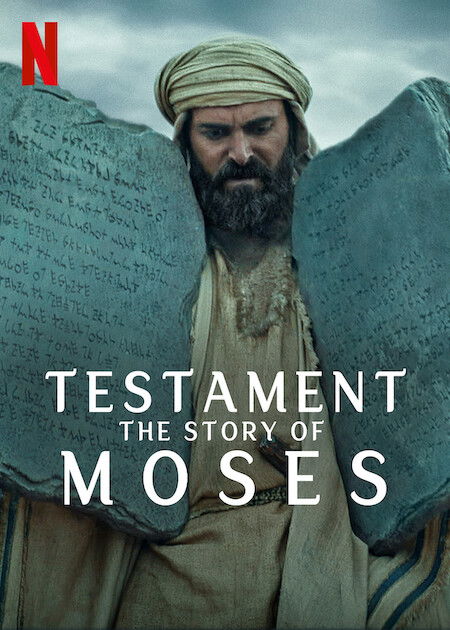“The Good, the Not So Good and the Confusing”

| None | Light | Moderate | Heavy | |
|---|---|---|---|---|
| Language | ||||
| Violence | ||||
| Sex | ||||
| Nudity |
What You Need To Know:
The dramatic re-enactments in TESTAMENT: THE STORY OF MOSES are well produced. However, the commentaries slow down the miniseries. They also contain some extra-biblical perspectives, including some feminism, determinism and slight misrepresentations about God is. So, MOVIEGUIDE® advises caution for younger children, although TESTAMENT: THE STORY OF MOSES is generally an interesting, ambitious, watchable miniseries.
Content:
The dramatized segments stick close to the biblical account of Moses, but the interviews discussing the segments are divided between a Christian theologian, Full Gospel pastor, another big church pastor, several rabbis including a female rabbi, and several Muslims including a female Muslim spokesperson, who sometimes diverge from biblical theology;
No foul language;
Egyptian overseers beat Hebrew slaves, Moses kills an overseer with a rock, the first born in Egypt die for the last of the biblical plagues, Pharoah’s army is swallowed up in the Red Sea, some of the people threatened with death but not killed, and discussions of wars that occur offscreen;
No sex, some light hugging and kissing between Moses and his wife;
Some upper male nudity;
Some wine drinking, not excessive;
No smoking or drugs; and,
Pharoah promises to release the Hebrews, then reneges several times, just as it says in the Bible, several Hebrews in the Sinai complain about God and say they want to go back to Egypt and otherwise show ingratitude, Aaron builds the golden calf to worship, Moses gets angry and throws down the tablets of the Law.
More Detail:
The first part, titled “Prophet,” starts with Moses on Mount Sinai with God saying that His name is, “I am that I am”. Then, there’s a flashback to the birth of Moses during the period when the Pharaoh has said all the male Hebrew babies must be killed. The midwives refuse to kill the babies. Moses’ mother puts him in a basket. Princess Bithia, whose uncle is Pharaoh at that time, has just lost a baby, so she adopts Moses, and thanks to Moses’ sister, Miriam, gives the baby to Moses’ real mother to nurse for several years. Of course, all these women are commended.
Moses grows up as Prince of Egypt and then gets angry and kills one of the slave drivers who is beating one of the Hebrew slaves. He escapes into the Arab peninsula to the Land of Midian where he meets Zipporah, the daughter of Jethro, who’s the high priest of Midian. Moses is extremely humble, works hard for Jethro and marries Zipporah. However, he keeps noticing a fire on top of Mount Sinai, Finally, which watching the sheep, he comes face to face with the burning bush, and God gives Moses his assignment to return to Egypt to rescue the Hebrews.
If some of the commentaries had been cut out, Part One would be much more exciting. As it is, the commentaries slow it down and raise some extra-biblical issues, but they are not detrimental to the biblical story.
Part II is titled “The Plagues.” God sends Moses back to tell Pharoah, “Let my people go.” Moses says that he not a good speaker, so God appoints Aaron, his older brother, to speak for Moses. Moses doesn’t remember Aaron, but they meet when Moses enters Goshen with his wife and children. Moses tells everyone he talked to God. They doubt him until his very old and infirm mother confirms that Moses knows the name of God when he whispers the name in her ear. Then, he gathers the Hebrews together and says they’re going to worship God in the desert for three days, and then secretly leave for the Promised Land.
When Moses and Aaron go talk with Pharaoh, Moses performs his first miracle by turning his staff into a snake, which the Egyptian magicians duplicate, but Moses’ snake kills their snakes. Pharaoh refuses to be impressed. The Pharaoh in TESTAMENT: THE STORY OF MOSES is very convincing. Of course, Pharoah is Moses adopted brother. Moses adoptive mother, Bithia, tries to convince her brother, now the Pharoah, that, instead of being hard-headed, he should be wise and loving and let the Hebrews go sacrifice in the desert.
At any rate, the interaction between Pharaoh and Moses goes through all the plagues until the final plague, which is the death of the first born in every family except in the Hebrew homes because they obeyed God and painted blood around their doors and held the Passover feast featuring the sacrificial lamb. The Christian commentators draw the analogy several times to Jesus, which is refreshing.
The third episode, titled “Promised Land,” starts with the death of the firstborn and Pharoah finally recognizing the Hebrew God is more powerful than his so-called gods. The commentary notes that in the Bible God pronounces the awful judgment on the Egyptians, but the Bible then seems to water down God’s responsibility by talking about the Angel of Death. There are also some slight Muslim insinuations where God says that He’s the destroyer when the Bible talks about God trying to rescue his people.
At any rate, Pharaoh decides to let the people go. Bithia joins Moses, as she does in the Bible. A pillar of cloud leads them and protects them by day, and a pillar of fire leads them at night.
Pharoah quickly changes his mind and starts to chase the Israelites. God divides the Red Sea so the Hebrews can cross it but closes it so that the Egyptians are swallowed out.
After that, we have the famous song of Miriam from Exodus 15: 20 and 21. Then, the story follows the trials and tribulations of the Hebrews, and Gods provision and protection for them in the desert for 40 years until they get to the Promised Land.
The ending, where Moses can’t go into the Promised Land, is a slight dramatic deviation from the biblical account, but not contrary to the biblical account. There are also a couple other deviations that are not worth annoying.
The Full Gospel pastor references Martin Luther King, Jr’s speech that says he can see the promised land but of course he doesn’t go into the promised land.
Unlike Episode Two, this third episode almost puts Moses on the same level as Jesus. Also, this episode skirts over the judgments God pronounced against the rebellious Hebrews. One of the rabbis at one point says that none of us reaches the promises land, adding that the whole story is that we’re all on a journey. For those of us who know Jesus, we have been redeemed and we have peace with God. When we accept Jesus, our journey changes from our own selfish propensities to the Good News of God’s guidance through the power of His Holy Spirit.
TESTAMENT is an ambitious series for Netflix. Sometimes the diversity casting is deficient. Also, it would have been nice if it had just been dramatized and not slowed down by commentators, some good and some not so good. The Jewish and Muslim commentators cite non-biblical stories to make their points. Because of the commentators, and the deviations from the biblical text, MOVIEGUIDE® advises caution for younger children and urges parents if they want to see it, to help their children understand it.


 - Content:
- Content: 

